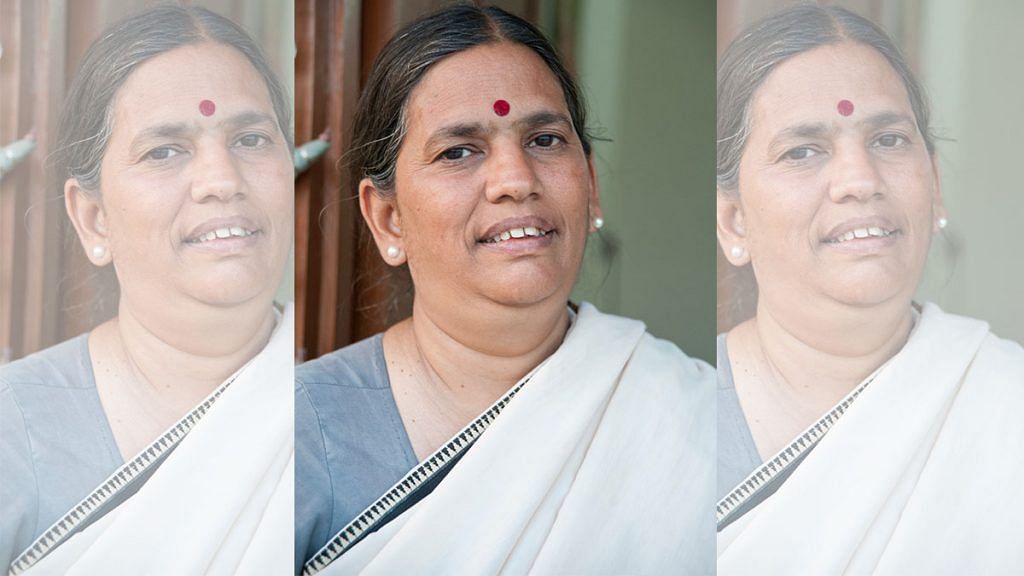New Delhi: A new e-book based on a long interview with human rights lawyer Sudha Bharadwaj, who has been under arrest for more than two years now, was released Sunday.
The book, titled Sudha Bharadwaj Speaks: A Life in Law and Activism, is based on an interview conducted by lawyers Santanu Chakraborty and Darshana Mitra just before Bharadwaj was arrested in the infamous Bhima Koregaon case in 2018. It was released at a webinar by author Nayantara Sehgal.
On the panel were also Bharadwaj’s daughter, Maaysha, her lawyer Yug Chaudhary, social activist Harsh Mandar, historian Uma Chakravarti, among others.
Breaking down as she related her mother’s ordeals in the prison, Maaysha said that her mother sometimes misses home profusely and expresses her desire to be home with her daughter. “I am very proud of my mother,” she added.
Meanwhile, Bharadwaj’s lawyer, Chaudhary said: “I have not come across a braver and more uncomplaining client before.”
He added that her arrest was based on frivolous evidence that could not stand even five minutes of incarceration. The main evidence against Bharadwaj were images of unsigned and unaddressed letters, which alleged that she was involved in bomb-making activities, and that she was training youngsters to enter the Maoist fold.
“These are unsigned, undated letters with no trace of authorship, no sender, no addressee…And they have not even been found on Sudha’s laptop,” he said. “There is no evidence that these letters even exist or the acts that Sudha is accused of even happened.”
He further added that while it has been a settled matter of law in India that incriminating correspondence between two people about a third person does not qualify as evidence against the third person, in Bharadwaj’s case this does not apply since the Unlawful Activities (Prevention) Act has been invoked against her.
Under the UAPA, the admissibility or legitimacy of the evidence is not considered while giving bail to an accused but only whether or not the offences of which the person is accused are bailable or not.
“As a result, in Sudha’s case, the law has been put on the backburner, and passions have been inflamed,” Chaudhary argued. “Of late, we have seen that trial courts in India have become rubber stamps for the government in cases of terrorism, so unless we get Sudha out before the trial begins, she might be in there for a long haul.”
Also read: 2 years, 3 charge sheets & 16 arrests — Why Bhima Koregaon accused are still in jail
Bharadwaj talks about life as human rights lawyer in book
In the newly-released book, Bharadwaj has talked about her life as a human rights lawyer and her work as a social worker and a trade unionist.
“I think one of the biggest enigmas before a human rights lawyer would be, that the people who need you the most, can’t afford to pay for you. And I think this is something for which a solution needs to be found. Actually, the solution needs to be found socially or institutionally, but unfortunately, individuals are left to find for themselves a way out of this dilemma,” Bharadwaj said in the book.
She added: “For example, as far as I was concerned, I was anyway a social worker, a trade unionist, and I anyway came to the profession because I wanted to work for a cause. And in that sense, I did not come because law was my profession. So obviously, as far as I was concerned, I was willing to work very hard, and live very simply, try and get the best deal for my clients as possible. I did not look upon them as my clients, but more as people as I was representing in courts because I felt at one with their cause, the trade unions, the organisations.”
At the book’s release, former civil servant and social activist Harsh Mander said that the case against Bharadwaj is symptomatic of the “darkness of this moment in the Indian democracy”.
“While she could have chosen a comfortable middle-class life in the US, where she was born, or Delhi, Sudha always made different choices in her life,” Mander said.
He added: “She had a natural instinct for justice and law, and that is why she became a lawyer in 2000, after which she would go on to fight several cases against those whose lands were forcefully acquired by corporates, the marginalised, women who were victims of sexual violence, etc.”
Mander also called for Bharadwaj’s release from prison, noting that “for the sake of those who believe in democracy, and the people who she stood for, it is crucial that Bharadwaj, whose health has been deteriorating in the prison, gets freedom soon”.
Also read: Historians’ silence on Bhima Koregaon allowed BJP to brand it as ‘urban Naxalism’
